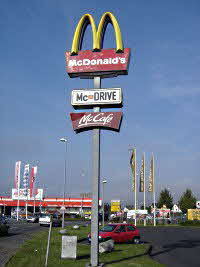THE GREENING OF MCDONALD'S?Dear EarthTalk:
Has the McDonald’s restaurant chain made significant improvements in recent years with regard to the environment?
Max Andria, Laval University, Quebec Long a poster child of environmental ills and health concerns, McDonald’s has worked steadily over the last two decades to clean up its act. The company will never win over vegetarians, who eschew meat for health, animal welfare and even world hunger concerns (we’d feed more people by using the land used to grow animal feed to grow food for people instead), but it has otherwise made some significant strides.
The company first came under fire from greens in the 1980s for sourcing beef for its hamburgers from ranches on newly cleared, former rainforest tracts throughout the Amazon basin. In response, the company committed in 1989 to refuse beef sourced from recently deforested rainforest areas. 
The restaurant chain has made some significant strides in reducing waste, saving energy and protecting forests by developing a zero deforestation plan for all the products it sources. Photo Credit: harry_nl, courtesy Flickr |
|
Environmentalists were also on the company’s case about the waste it generates. So in 1990 McDonald’s partnered with the Environmental Defense Fund (EDF) and began phasing out its polystyrene “clamshell” food containers and increasing the recycled content of the other food containers and boxes it uses. EDF and the fast food giant developed a waste reduction plan that eliminated 300 million pounds of packaging, recycled a million tons of corrugated boxes and reduced waste by 30 percent in the decade that followed.
More recently, Greenpeace exposed the fact that expanded soy farming in Brazil—which feeds chickens used by McDonald’s and other large food companies—had become a threat to the Amazon rainforest. In response, McDonald’s partnered with Greenpeace to develop a zero deforestation plan for all its products.
Likewise, McDonald’s beef purchasing executives have gotten in on things: In November 2010 the company was lead sponsor of the World Wildlife Fund’s first Global Conference on Sustainable Beef, an international meeting of stakeholders in the global beef system convened to discuss how to approach sustainable beef production in socially, environmentally and economically viable ways.
Another green highlight for McDonald’s is its commitment to matching 30 percent of the electricity used at its company-owned stores with renewable energy credits from American wind power providers. And several Japanese McDonald’s are participating in an energy-saving campaign employing 13 different green technologies with the goal of reducing greenhouse gas emissions by more than 20 percent overall.
While McDonald’s is moving in the right direction, it is still widely criticized for the waste it generates and its contribution to health woes such as obesity. For its part, the company has limited control over the 80 percent of its stores that are run by independent franchisees, so change under the golden arches is slow.
This past spring, McD’s released its Global Best of Green report highlighting advances made in energy efficiency, sustainable packaging, anti-littering and greening the workplace at hundreds of its restaurants around the world, underscoring it’s commitment to sustainability moving forward. The company hopes the new report will serve as a catalyst for franchisees to make similar improvements in their businesses. CONTACTS: EDF, www.edf.org Greenpeace, www.greenpeace.org February 2013
EarthTalk® is written and edited by Roddy Scheer and Doug Moss and is a registered trademark of E - The Environmental Magazine (www.emagazine.com). Send questions to: earthtalk@emagazine.com Subscribe: www.emagazine.com/subscribe
| 